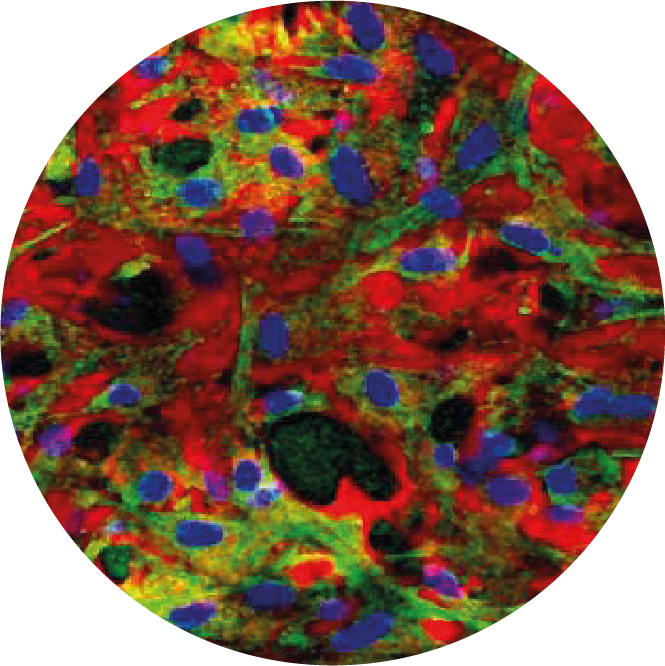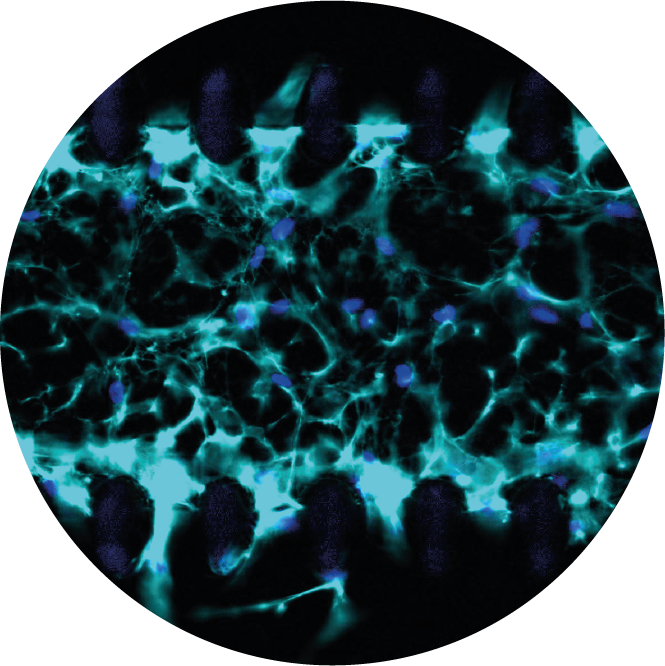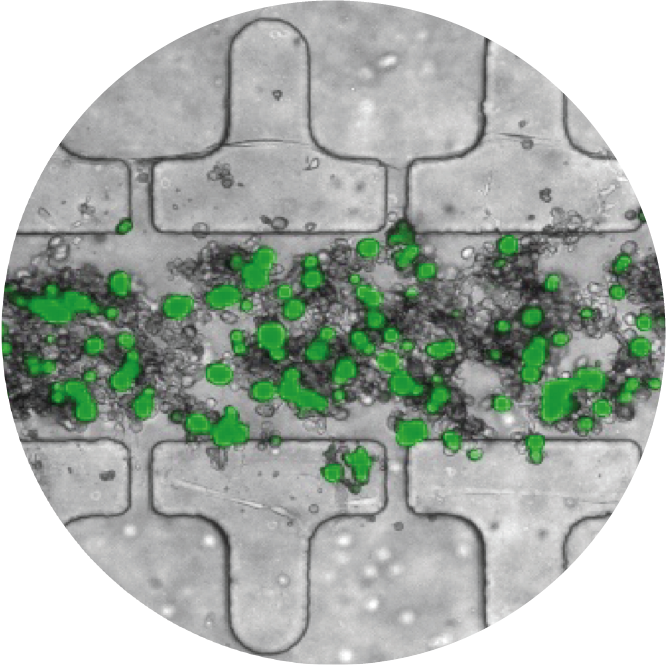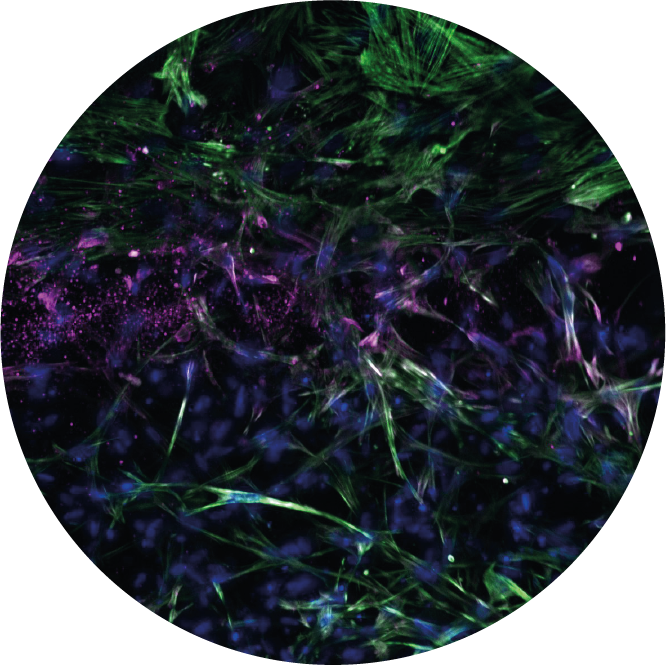BiomimX Applications - Efficacy in Diseases
Predict therapeutic candidates’ efficacy in human models of diseases
The Challenge
Obtaining clinically relevant data on candidate efficacy from pre-clinical models.
The limited translational power of existing preclinical tools in delivering clinically relevant outcomes hampers the ability to accurately assess lead candidates’ efficacy before clinical trials. Current preclinical tests fall short in replicating the complex mechanisms of human diseases, often missing key clinical biomarkers. This gap undermines the ability to replicate drug effects and fully understand the mechanisms of action of new treatments.
BiomimX's Solution
Predict human response at the pre-clinical level to select the most effective leads for clinical phases.
BiomimX’s uBeat® powered solutions offer the possibility to model human complex diseases, enabling to improve the understanding of pathological states and to elucidate the mechanism of action of candidate leads already in the pre-clinical phase. Our technology can bridge the gap left by simplistic in vitro and animal models, improving the efficacy of your R&D pipeline.
Disease-modifying osteoarthritis (OA) drug efficacy
Assess the efficacy and mode of action of biomolecules in preventing and/or reverting osteoarthritic traits in uKnee model by focusing on inflammation, degradation and cartilage phenotypic markers.
uKnee is the first in vitro model of human OA cartilage emulating OA traits (anabolic-catabolic imbalance, inflammation, calcification) in a chemical-free setup, triggered only by a pathological mechanical overload emulating the mechanical trigger of the disease. uKnee is characterized by a genetic profile which correlates with clinical evidences. uKnee pioneering tool has been validated with anti-inflammatory and anti-degrading clinically approved drugs in collaboration with Fidia Farmaceutici, demonstrating treatment responses in reducing joint pain and OA-derived processes.
Ready to explore solutions beyond cartilage? Consult with our experts to discover our uKnee-based solutions for modeling multi-tissue interactions in joints and addressing different joint-related pathologies (e.g. rheumatoid arthritis).
Check out our publications (Occhetta et al., Nature Biomed Engineering, 2019) and posters.

Anti-fibrotic drug efficacy
Assess the efficacy and mode of action of biomolecules in preventing and/or reverting fibrotic traits in uScar model, by focusing on cell phenotype switch and on extracellular matrix remodeling.
uScar is the first in vitro model replicating the onset and progression of cardiac fibrosis in a chemical-free setup. uScar indeed induces pro-fibrotic pathways activation, fibroblast to myofibroblasts transition, and matrix deposition by the sole application of a mechanical stimulation resembling the heartbeat. uScar has been validated with commercially available anti-fibrotic drugs (Tranilast and Pirfenidone), demonstrating treatment responses in terms of reduction of cell phenotype switch and matrix deposition.
Ready to explore solutions beyond cardiac application? Consult with our experts to explore how uScar concept has been applied to model other kind of fibrosis (e.g. Lung).
Check out our publications (Visone et al., Advanced Health Mat, 2023; Mainardi et al., Lab On a Chip, 2021; Occhetta et al., Integr Biol, 2018) and posters (Lucifora et al., EUROoCS 2024).

Injectable therapeutics efficacy
BiomimX® uBeat®-powered models are the ideal tools to assess the efficacy of new injectable therapeutics developed to act locally in a dynamic environment, recapitulating in vitro their effects before undergoing long and expensive clinical trials.
Efficacy data from our uKnee model allowed Synartro BV, a Sweden biotech company developing a new anti-OA combined injectable therapy, to file a successful . Our relevant pre-clinical data complemented efficacy studies conducted in a rat model, which returned vague efficacy results.
Check out our publications (Palma et al, Advanced Health Mat, 2024).

Gene and cell therapy’s efficacy
BiomimX® uBeat®-powered models provide an ideal platform for evaluating the efficacy of new gene and cell therapies in a dynamic, in vitro environment. These models replicate the complex, localized effects of these advanced treatments before progressing to lengthy and costly clinical trials.
In collaboration with Politecnico di Torino, the efficacy of a gene therapy based on a combination of micro-RNAs generated to directly reprogram cardiac fibroblast into cardiomyocytes was tested in uScar model. Surprisingly, when applied in a mechanically active environment (e.g. resembling heartbeat), this therapy demonstrated able to mitigate some fibrotic traits, but failed in cell reprogramming, anticipating a shortcoming that could have led to a failure in clinical trials.
Check out our publications (Visone et al., Advanced Health Mat, 2023).

Take Advantage from our uBeat® based solution
- Rely on efficacy data of your lead therapeutic candidates generated in human relevant models of complex diseases.
- Complement your efficacy data from preclinical animal studies, elucidating the mechanism of action in human models.
- Elucidate the mechanism of action of lead therapeutic candidates that exhibit unexpected outcomes in clinical trials.
